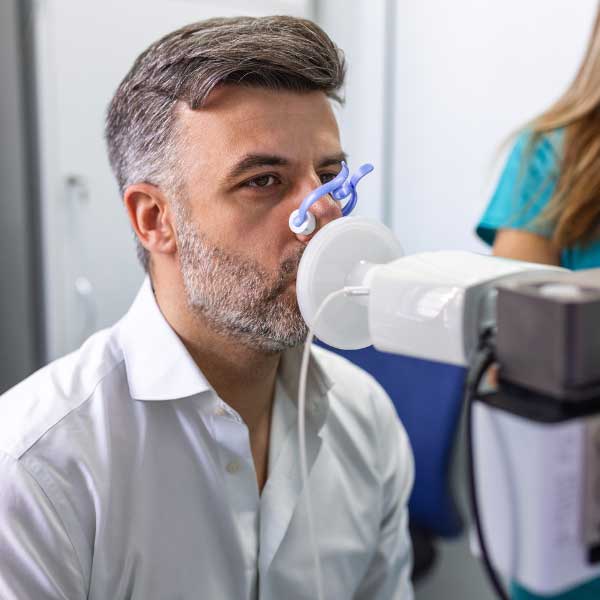
If you’ve been experiencing shortness of breath or have been wheezing or coughing, your doctor may suggest a breathing test called spirometry.
What is Spirometry?
A spirometry test helps diagnose conditions such as asthma or chronic obstructive pulmonary disease (COPD). It also checks if certain lung conditions have improved or worsened throughout treatment and evaluates lung function before surgery.
Spirometry is one of the most common pulmonary function tests (PFTs). It measures how much air you can take in (inhale) and how quickly you can breathe it out (exhale). In this test, you’ll take a deep breath from a mouthpiece and then blow out the air as fast as you can into a tube connected to a machine called a spirometer.
The test frequently involves inhaling medications called bronchodilators, which are designed to open up your airways. Spirometry results taken before and after the medication help your physician decide if bronchodilators are right for you.
How to Prepare for Your Test
You should:
Avoid heavy exercise at least four hours prior to this test
Don’t eat a heavy meal three hours before test
Stop smoking three hours before test
Don’t consume alcohol three hours before test
Wear loose clothing that allows you to expand your chest (no tight belt or vest)
Your appointment may be rescheduled if you haven’t prepared according to these criteria.
Call us ahead of time if you:
Have an inability to follow instructions*
Have had a heart attack in the last month
Have uncontrolled hypertension
Are pregnant
Are currently using cholinesterase inhibitor medication (e.g. myasthenia gravis)
Are using beta-blockers (e.g. acebutolol, carteolol, labetalol, propranolol)
Have chest or abdominal pain
Have oral or facial pain
Have had recent eye surgery (1 week to 6 months, depending on surgery)
Have had recent brain surgery or an injury (3 to 6 weeks)
Have had a collapsed lung (2 weeks)
Are spitting up blood
*If a patient is unable to follow instructions due to a confused state, young age or dementia, then a parent, caregiver or guardian may call on their behalf.
Medications to Pause Before Your Appointment
Do not take any of the following medications during the window of time outlined before your appointment:
Short-acting inhaled beta-agonists in conventional doses (e.g. albuterol): 6 hours
Long-acting inhaled beta-agonists (e.g. salmeterol): 36 hours
Ultra long-acting beta-agonists (e.g. indacaterol, vilanterol): 48 hours (2 days)
Long-acting anticholinergics (e.g. tiotropium): 168 hours (7 days)
Short-acting anticholinergics (e.g. Atrovent® 40 μg): 12 hours
Oral theophylline: 12-24 hours
You can find more information on medications to pause:
Need More Information?

The American Thoracic Society provides information on pulmonary function tests:
If you have any questions about your test, please call us:
Adult Testing
Pediatric Testing
For your health information, including access to medical records, lab results and bill pay, download our MyHealthMate app today.
We use cookies and other tools to optimize and enhance your experience on our website. View our Privacy Policy.

